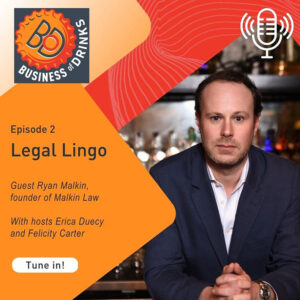On Episode 2 of The Business of Drinks podcast, Ryan Malkin joins to discuss Legal Lingo (or How to Not Get Screwed). Ryan Malkin shares his knowledge on how to navigate in the alcohol beverage industry. In the podcast he dives into some of the key issues people should consider when launching a product. Ryan emphasizes how crucial it is for new companies to assure that they have a business plan that will lead them to success. Oftentimes, Ryan speaks about how companies want to be able to play every role in the industry such as direct ship to consumers in every state, import their brand and be their own retailer. Ryan emphasizes that this isn’t legally possible for many companies or practical in all cases. Companies must remember that it’s a crowded market so it is important to assure that your business has staying power. What will set your product apart from the rest and what will keep your consumers coming back, are questions that companies must ask themselves in order to have success in the industry, Ryan suggests.

In this podcast Ryan even dives into what a company without a distillery needs in order to sail smoothly. For brands that don’t have a distillery, Ryan recommends making sure they have reliable co-packers, in which everyone understands that everyone knows what they are responsible for. The agreements must be clear and outline everyone’s responsibility. The reason in which the agreements have to be concise is because if there is ever a problem with anything, the agreement should be able to pinpoint everyone’s responsibility. Not only should the agreements with the co-packers be thoroughly reviewed in order to ensure that the brand won’t face any hardships in the future but any agreement in general. Something to keep in mind is that many distributors will often try locking in brands with their agreements. These agreements’ bottom line will often state that if the contracts aren’t renewed the brand/companies fees will be multiplied. These are one of the many things that Ryan states he tries advising upcoming brands about, in order to avoid future issues.
Ryan goes through the steps a brand should take when they are an early stage brand as well. The first step would be to form a company. Secondly, the company should file for their trademark. Once the brand has their trademark they should decide whether they will start their own facility or go through a co-packer. Before hitting the market, obtain licenses. Every state has different rules and regulations in which the brands must abide by as well.
Ryan launched an app (Set the Bar) that brands can use to help navigate the industry. The app includes many of the rules and regulations of all the states in the U.S in an easy read formatting. The app helps brands avoid legal casualties, and even comes with a quiz to test the knowledge of its users. Note: the app is not a legal app.
You can also hear about all the different routes a brand can potentially take when it comes to distribution, such as self-distribution, and brands getting their own wholesale permit. Ryan recommends going through this process backwards, in the sense that he advises brands to ask accounts who they would potentially buy from in order to make the best decision for their brand. This essentially gives the brand a good sense of the market. Ryan also tackles the subject of budgeting in this podcast, in which he talks about where the majority of the budget goes into and things of the sort.
To hear the complete podcast click here: https://open.spotify.com/episode/3sAH40MQFWCOnly7fqRdxX?si=1fe15fa00fd74c20&nd=1

